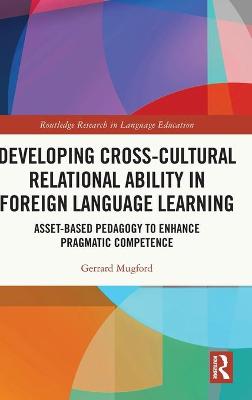Routledge Research in Language Education
2 total works
Developing Cross-Cultural Relational Ability in Foreign Language Learning
by Gerrard Mugford
By reconceptualizing successful communication in a foreign language as an enjoyable and uplifting experience, this volume moves beyond a focus on grammatical accuracy and fluency to foreground the ways in which foreign language learners can be encouraged to build on previous achievements and communicative successes in the target language and so develop confidence, commitment and cross-cultural relational ability.
Building on Mugford's previous volume, Addressing Difficult Situations in Foreign-Language Learning (2019), this text draws on grounded qualitative data collected through questionnaires, semi-structured interviews and conversations with Spanish-speaking learners of English, to illustrate how learners' experiences and insights can be used to inform a productive pedagogy centred around language users' communicative objectives and interactional successes. Chapters highlight bilingual speakers' conscious language use, practices and choices in the target language and the reasons and implications for such deliberate communicative practices and relational behaviour. In doing so, Mugford is able to outline a critical relational pedagogy designed to better equip language learners with the confidence and pragmatic resources they require to engage in positive cross-cultural relational work.
As a valuable, student-centred contribution to teaching and learning of modern foreign languages, this volume will be key reading for researchers, scholars and educators with an interest in language education, TESOL, World Language teaching and Applied Linguistics.
Towards a New Pedagogy for Teaching Foreign Language Politeness
by Gerrard Mugford
This book examines how foreign language speakers establish and maintain social and transactional relationships in their target language, and how pedagogic intervention can help learners implement practices that will allow them to participate and react in both socially acceptable and individualistically empowering ways.
Arguing that ‘doing’ foreign-language politeness and culture does not simply involve the indiscriminate and uncritical adoption and implementation of target-language patterns and practices, the author advocates instead for active, judicious and even critical social action. As such, the book presents a dynamic and vibrant dimension to target language politeness and cultural practices, demonstrating that raising learners’ critical language awareness in identifying productive communicative resources and assets can lead to successful interpersonal and transactional communication. Building on this notion of a ‘positive’ pedagogy, Halliday’s model of ideational, interpersonal and textual is utilised as a framework for exploring how foreign language users can approach target language politeness in terms of prosocial, interpersonal and contested politeness, with reference to a study of Mexican speakers of English as a foreign language.
Heightening awareness of foreign language politeness patterns and practices, as well as presenting knowledge and resources for overcoming challenges and accentuating benefits of a nuanced learning scheme for politeness in foreign language, this book will appeal to language educators, researchers and bilingual speakers. It will also benefit those working across pragmatics, sociolinguistics, TESOL, cultural studies.

